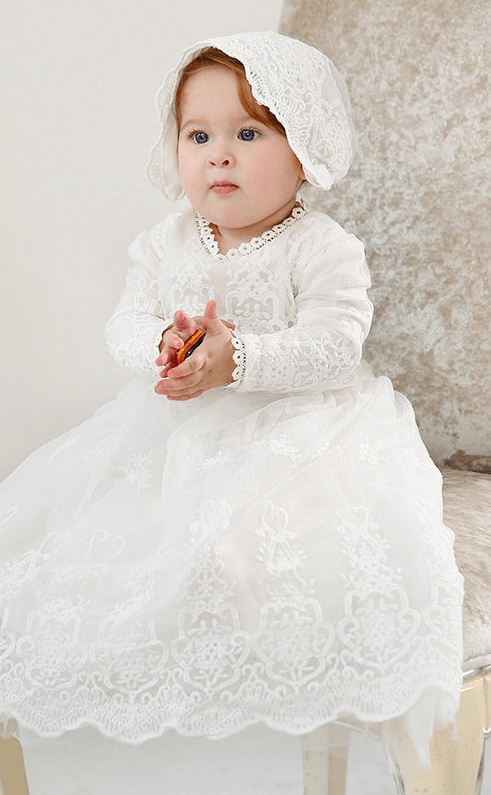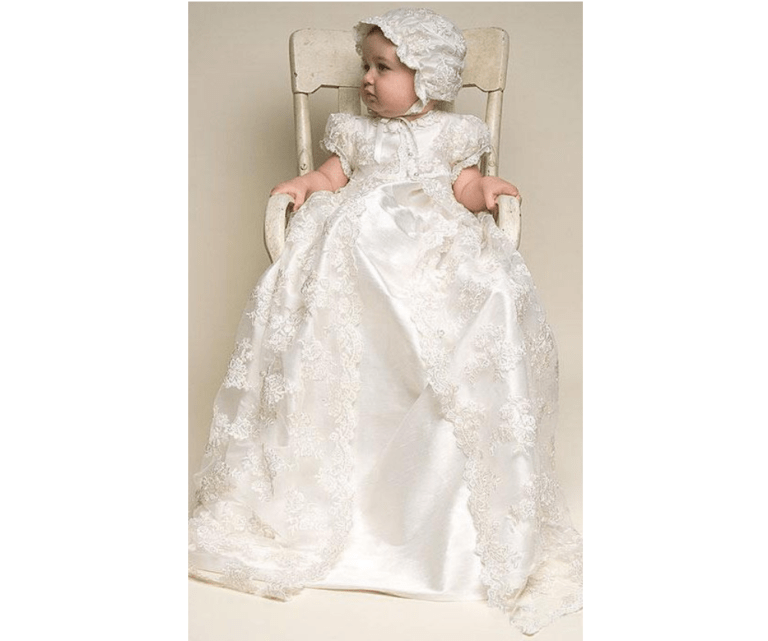Christening gowns are precious treasures. Their delicate beauty and cherished symbolism enrich lives throughout the years. Their fine fabrics hold our memories. To ensure their continuity, Baptism dresses must be preserved in correct fashion.

Store A Spotless Gown
To survive throughout the years, gowns must be spotless before storage. Even colorless stains such as body oils or perspiration can cause damage over time. Satins and most silks require dry cleaning. Always inform the dry cleaner about the stain type. Water or sugar stains do not respond to normal dry cleaning methods. Such stains require the use of additional solvents.
Always check care labels before you attempt to clean a christening gowns. When hand washing christening gowns, use lukewarm water and an enzymatic cleaner. Do not use fabric softener or starch. Then rinse, rinse, rinse with cool distilled water! All residue must be removed or it will harm the fabric.
Air Dry The Gown
Air drying is required for such delicate fabrics. Laying your gown flat while drying is the best method. Do not store a gown until it is completely dry to the touch. Never iron a dress before storing it. Ironing will remove moisture from the fabric.
Avoid Contact With Metal
Metal hangers are a gown’s worst nightmare. Use padded hangers. Avoid contact between a gown and any metals. They can corrode and cause damage upon contact.
Use Only Acid-Free Paper
Soft tissues are often used to stuff sleeves to help them keep their shape. They are also used to minimize folds (less folds, the better). Only acid-free tissue, however, should ever touch christening gowns. Scrapbooking stores are frequent suppliers of acid-free tissue. Online sites for preservation of vintage clothing also offer this type of tissue.
Cool blue or soft pink tissue looks pretty but instead always choose pure white. If colored tissue became wet, the color could transfer to the gown. Ordinary paper boxes can not be used to store dresses. Any type of paper around a gown must be an acid-free product.
Store In A Cotton Or Special Preservation Bag
Baptism dresses may be purchased and stored for a short period in vinyl garment bags. For long term storage, however, gowns must never be stored in vinyl or plastic. Contact with these materials can harm the dress over an extended period of time. Their presence can lead to discoloration and deterioration.
The dress needs to breathe to survive the years. If fabric can’t breathe, it will fade and turn yellow. All natural cotton creates the safest storage. No dyes or chemicals must ever be allowed to come in contact with a christening gown. Satin dresses (and others) which require dry cleaning may be packaged onsite by a preservation specialist.
Store In An Appropriate Size Garment Bag
Store dresses in garment bags appropriate for the individual gown. Garment bags come in different sizes. Christening celebrations can be held at different times in a baby’s life. Some christenings are held shortly after birth. Others are not held until months into the first year. Boys’ christening outfits will not require as roomy storage as the full folds of girls’ gowns.
A dress should never be squashed in a garment bag. The length of the child formal dresses and the folds need to fall naturally in place. If there is sufficient room, mementos of the christening – socks, blankets, or other keepsakes – can be stored at the bottom of the bag.
Store The Gown In A Cool, Dry Place
A hot attic or a damp basement should not be home for a christening gown. Heat and humidity are not kind to heirloom gowns. Sunlight may brighten our lives but extended exposure to sunlight will dull and yellow a dress.
The dress should be stored in a room with a consistent temperature. A dark, dry closet provides the perfect atmosphere. Don’t store other bags or boxes on top of the christening gown.
Don’t Forget The Gown
The adage – out of sight, out of mind – doesn’t apply to a christening gown. At least every few years, you need to check its condition. The fibers need to be rehydrated before further storage. Rehydration is a simple process.
Soak the dress in lukewarm water for a few hours. Air dry again and store in the garment bag. Wearing white gloves during this process will ensure against the transfer of body oils.
Store For Future Generations
Proper storage methods can’t provide an absolute guarantee of pristine condition. Yet correct storage significantly increases the chances of a perfect preservation. Some yellowing in gowns may occur over an extended period. This patina can even add to the appeal of a heirloom dress.
Even when a baptism dress becomes so delicate that it is unwearable, it can still be preserved in a museum-mount frame. The christening gown will be able to touch lives even further into the future. You can still continue to store your treasured gown and your precious memories.



Comments are closed.